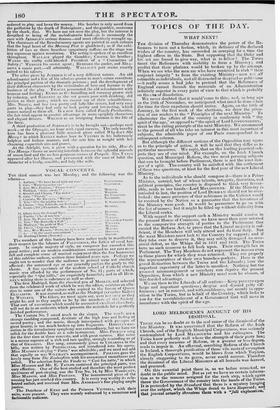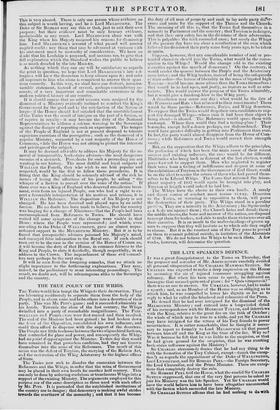LORD MELBOURNE'S ACCOUNT OF HIS DISMISSAL.
THERE can be no doubt as to the real cause of the dismissal of the late Ministry. It was ascertained that the Reform of the Irish Church, and of the English Municipal Corporations, was seriously contemplated by Lord MELBOURNE and his colleagues. The Tories know perfectly well where the strength of their party lies; and that every measure of Reform, in a greater or less degree, tends to impair it. An effectual, searching Reform of the Church in Ireland, a thorough purification of those vile nests of corruption the English Corporations, would be blows from which Toryism, already staggering to its grave, never could recover. Therefore the dismissal of the Liberal Ministers at all hazards was decreed, and procured. On this essential point there is, as we before remarked, no doubt in the public mind. But as yet we have no certain informa- tion as to the reasons assigned for the rash step, w Welt again threw the Government of the country into the hands of the Tories. It is pretended by the Standard that there is a mystery hanging over the subject, which the Whigs dread to have dispersed; and that journal actually threatens them with a lull explanation, This is very absurd. There is only one person whose evidence on this subject is worth having, and he is Lord MELBOURNE. The Duke or Sir ROBERT may say this or filet, just to suit their own
purpose; but their evidenee must be only hearsay evidence, inadmissible in any court. Lord Mesfieuttem alone was with
the King when his Majesty assigned his reasons for dismissiog him. Lord ISIEenounNe's account of what passed will receive implicit credit : any thing that may be advanced at variance e ith his statement must be unworthy of consideration. We have no doubt that his Lordship is prepared, and anxious too. to give that full explanation which the Standard wishes the public to believe is so much dreaded by the late Ministry.
As nothing which they can say will be satisfactory as regards the point in question, we hope that Lsrd MEsnouitas's late col- leagues will have the discretion to keep silence upon it ; and refer all inquirers to him who alone is competent to answer their ques- tions correctly. In this way, we shall have one distiect, incontro- vertible statement, instead of several, perhaps contradictory ac- counts, of a very important and remarkable occurrence in the modern political history of our country.
If it should appear that no solid reasons were assigned for the dismissal of a Ministry evidently inclined to conduct the King's Government for the good and to the satisfaction of the Nation at large—if the House should feel satisfied that the reestablishment of the Tories was the result of intrigue on the part of a faction, or of caprice in royalty—it may because the duty of the National Representatives to address a solemn warning to the Sovereign against the danger of repeating such an experinsent. The temper of the People of England is not at present disposed to tolerate capricious exercises of the prerogative ; such as the dismissal of a popular Ministry, supported by a vast majority of the House of Commons, vbile the House was not sitting to protect the interests and privileges of the subject.
It may be deemed nth isablc to address his Majesty for the re- moval of irresponsible, back-stairs advisers—the most dangerous enemies of a monarch. Precedents for such a proceeding are not wantiog in our history. The most dutiful and loyal subjects of INVitasism the Fourth, they who wish to see him popular and respected, would be the first to follow these precedents. It is fitting that the King should be solemnly advised of the risk he incurs if losing the affections of his people, by aiding " the whisper of a faction to prevail over the voice of the nation." If there over was a King of England who deserved considerate treat- ment, even from an injured People, one who had a right to ex- pect a favourable interpretation of his motives and actions, it is WiLsetst the Reformer. The disposition of his Majesty is not changed. Ile has been deceived and played upon by an artful faction. He no doubt has been made to believe, that the country was longing for a change of Ministers—that the People had been metamorphosed from Reformers to Tories. He should have waited till some symptoms of the change were visible in that bouss where the People were represented ; and which; even according to the Duke of WELLINGTON, gave an almost unpre- cedented support to the MELBOURNE Ministry. But it is to he feared that irresponsibla advisers poisoned his Majesty's mind, and conveyed false information to the Royal ear. If such should turn out to be the case in the opinion of the House of Commons, it will become the duty of that House, in common fairness to the King and People, to state it decidedly, though respectfully, in an address to the Crown. The impeachment of these evil counsel- lors may perhaps be the next step. It will he seen from the foregoing remarks, that we attach no slight importance to the forthcoming explanations. They may, indeed, be the preliminary to most interesting proceedings. The result, we doubt not, will be advantageous alike to the Sovereign and the country.

























 Previous page
Previous page